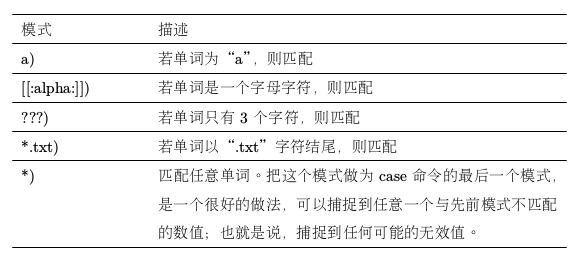Shell Foundation (6): position parameter and case branch
Keywords:
less
shell
Position parameter
sign
$0: script file absolute Lujin
$1-9: position parameter mark less than 10
${10..}: position parameter marker greater than 10
$×: total number of parameters
$*: expand to a list of location parameters starting at 1. When it's enclosed in double quotes
When it gets up, it expands into a string enclosed by double quotation marks, containing
All location parameters, each of which is the first one of the shell variable IFS
Characters (a space by default) are separated.
$@: expand to a list of location parameters starting at 1. When it's enclosed in double quotes
When it gets up, it expands each position parameter into a double quotation mark
Separated string from.shift: multi parameter list access one by one
usage
Each time the shift command executes, the value of variable $2 moves to variable $1,
The value of variable $3 moves to variable $2, and so on. The value of the variable $#, is also subtracted by 1.
Give an example
#!/bin/bash
count=1
while [[ $# -gt 0 ]]; do
echo "Argument $count = $1"
count=$((count + 1))
shift
done
case bifurcation
Basic grammar
case word in
[pattern [| pattern]...) commands ;;]...
esac
pattern matching

Give an example
#!/bin/bash
read -p "enter word > "
case $REPLY in
a|A) echo "is a or A." ;;
[[:alpha:]]) echo "is a single alphabetic character." ;;
[ABC][0-9]) echo "is A, B, or C followed by a digit." ;;
???) echo "is three characters long." ;;
*.txt) echo "is a word ending in '.txt'" ;;
*) echo "is something else." ;;
esac
Match multiple test conditions
#!/bin/bash
# case4-2: test a character
read -n 1 -p "Type a character > "
# ;;; & used to match multiple test conditions and continue to match the next one instead of exiting directly.
case $REPLY in
[[:upper:]]) echo "'$REPLY' is upper case." ;;&
[[:lower:]]) echo "'$REPLY' is lower case." ;;&
[[:alpha:]]) echo "'$REPLY' is alphabetic." ;;&
[[:digit:]]) echo "'$REPLY' is a digit." ;;&
[[:graph:]]) echo "'$REPLY' is a visible character." ;;&
[[:punct:]]) echo "'$REPLY' is a punctuation symbol." ;;&
[[:space:]]) echo "'$REPLY' is a whitespace character." ;;&
[[:xdigit:]]) echo "'$REPLY' is a hexadecimal digit." ;;&
esac
Posted by eatadi on Mon, 06 Jan 2020 01:51:07 -0800
